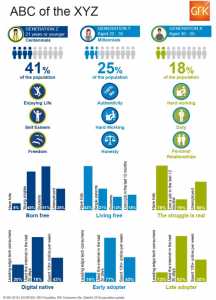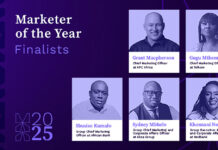By Rachel Thompson, Insights Director at GfK South Africa
South Africa’s young people – those aged below 35 years – make up 66% of the country’s population. They’re rapidly changing the workplace with their search for purpose, the consumer landscape with their demands for authenticity and personalisation, and society at large with their belief in social justice. Brands need to understand what makes them tick to secure a long-term future for their businesses.
Yet segmenting customers in a country as unequal and diverse as South Africa is far from simple. Thanks to the pace of technology and social change we have seen over the past 20 years, there are stark differences in the experiences and outlooks of someone aged 20 today and someone approaching their 35th birthday. South Africa’s political history adds a unique perspective to generational dynamics. And that’s without even considering the different perspectives you might find in a village in Kwa-Zulu Natal, a suburb in Cape Town and a township in Gauteng.
To better understand young South Africans, we have analysed GfK data, including the Consumer Life longitudinal study, conducted across 27 countries worldwide, and FutureBuy, a macro-economic study into the purchase habits of consumers across 25 countries. From this data, we glean some interesting differences and similarities between centennials — those aged 21 and below, who make up 41% of the South African population – and millennials – those aged 22 to 35, who account for 25% of the population.
Born-free versus living free
Born when democracy in South Africa was in its infancy, centennials (or Generation Z) did not experience the struggle against apartheid. They know South Africa as a noisy, unequal, complex country that is healing, growing and changing with them. Many of them are the most educated in their households, and face pressure to succeed and contribute to the family. Some 51% are students and 25% are unemployed.
By contrast, the first millennials (also known as Generation Y) were born 10 years before the advent of a democratic South Africa and the last were born at the close of apartheid. They have experienced rapid change in the social, economic and political landscape, making them optimistic and resilient. Around 43% have children, 21% are single parents, and 15% have lost their job in the past year or so.
Digital native versus digital early adopter
Centennials were born after mobile phones were first introduced in South Africa; an older centennial turning 20 in 2018 was born in the year that Google was incorporated as a privately-held company. Because they are the first generation to grow up in the world of cellphones and social media, centennials achieve a natural balance between real-life and the online world.
Millennials were entering their teens when cellphones hit South Africa. As such, they became a generation of early adopters who understand the impact of technology on the world and who are passionate about incorporating tech into their lives.
Among centennials, 30% are what we classify as leading-edge technology consumers compared to 16% of millennials. Where millennials adopt new technology for control, access to cutting-edge features, or to improve health and wellbeing, centennials look to new technology to save them money and offer fun, excitement and personalisation.
Working smart versus working hard
Both groups of ‘ennials embrace values of adventure, freedom and curiosity. Millennials show their hedonistic nature with the higher value they attached to enjoying life. They are more bound by duty and social status than the individualistic centennials. Centennials value power and wealth and look to achieve through being enterprising rather than working hard.
Internal focus versus external appearances
Our research indicates that millennials believe that external appearances are key and that they are looking for social recognition. They feel that their outward appearance reflects their inner-wellbeing; 56% said their individuality is reflected by how they look and 54% said individuality is reflected in what they buy. More millennials (13% of them) get cosmetic and elective surgery for beauty than members of Generation X. Centennials are more internally focused.
The Internet is the common ground
Nearly as many millennials (77%) and centennials (78%) accessed the Internet in the past 30 days, according to our research. In both groups, 38% are spending more than 10 hours a week online. However, centennials use significantly more free video downloads, streaming services and cloud storage than older generations.
Millennial and centennial consumers alike have high expectations from brands and innovation. They want products that are tailored to their personal quirks. They love collaboration and like to be involved in making products more relevant to their personal lives. For these consumers, disruption has become the norm and they expect marketers to come up with innovations that they didn’t even know that they needed.
ABC of the XYZ infographic:

About GfK
GfK is the trusted source of relevant market and consumer information that enables its clients to make smarter decisions. More than 13,000 market research experts combine their passion with GfK’s long-standing data science experience. This allows GfK to deliver vital global insights matched with local market intelligence from more than 100 countries. By using innovative technologies and data sciences, GfK turns big data into smart data, enabling its clients to improve their competitive edge and enrich consumers’ experiences and choices. www.gfk.com/en-za/
About Rachel Thompson, Insights Director at GfK South Africa
Rachel Thompson has 16 years of experience in market research, working first for Research International and then moving to GfK South Africa in 2009. She has experience across a wide range of research disciplines and a strong interest in innovation. Rachel has an Honours degree in Economics from the University of Natal.




















































































